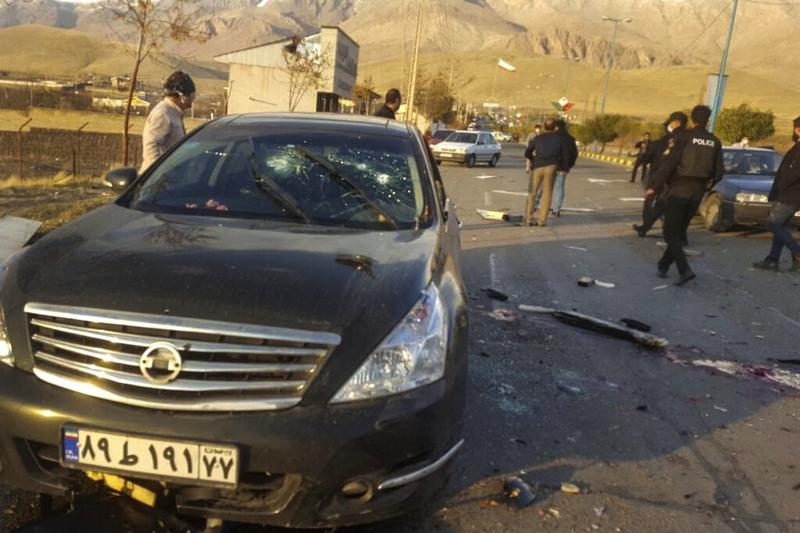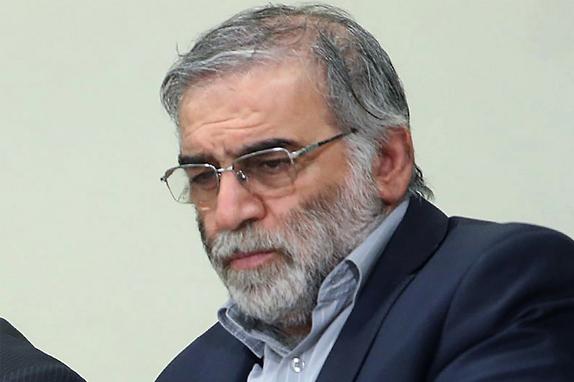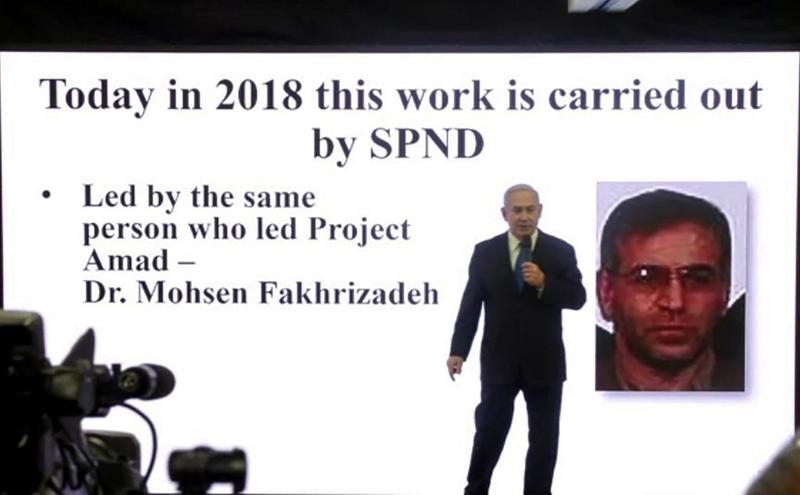 This photo released by the semi-official Fars News Agency shows the scene where Mohsen Fakhrizadeh was killed in Absard, a small city just east of the capital, Tehran, Iran, Nov 27, 2020. (FARS NEWS AGENCY VIA AP)
This photo released by the semi-official Fars News Agency shows the scene where Mohsen Fakhrizadeh was killed in Absard, a small city just east of the capital, Tehran, Iran, Nov 27, 2020. (FARS NEWS AGENCY VIA AP)
Iran accused Israel and the US of being behind the assassination of one of its top nuclear scientists on Friday and vowed revenge, sharply escalating tensions in the Persian Gulf in the final weeks of Donald Trump’s presidency.
Mohsen Fakhrizadeh was the head of research and innovation at Iran’s Ministry of Defense and widely seen as having a major role in the country’s nuclear program. He was killed close to the Damavand campus of Islamic Azad University, about 60 kilometers east of central Tehran, the semi-official Tasnim news reported.
Iran’s Supreme Leader Ayatollah Ali Khamenei promised on Saturday to retaliate for the assassination while Iran’s president accused Israel of killing Fakhrizadeh, state TV reported.
“Once again, the evil hands of global arrogance were stained with the blood of the mercenary usurper Zionist regime,” a term for Israel, President Hassan Rouhani said in a statement, according to state TV.
“The assassination of martyr Fakhrizadeh shows our enemies’ despair and the depth of their hatred... His martyrdom will not slow down our achievements.”
READ MORE: Iran says US blacklisting of 2 nuclear scientists 'desperate' attempt
Iran’s army said the US also bore responsibility, according to the Iranian Labor News Agency. The Minister of Defense, Amir Hatami, told state TV the killing was “clearly linked” to the US assassination of General Qassem Soleimani by drone in January.
Mohsen Fakhrizadeh’s death following the killing of four other Iranian nuclear scientists since 2010, with Tehran usually blaming the intelligence agencies of its arch foes, Israel and the US
The office of Israeli Prime Minister Benjamin Netanyahu declined to comment, as did officials at the Pentagon. The Central Intelligence Agency didn’t immediately respond to questions about whether the US had knowledge of plans to carry out an assassination.
Trump re-tweeted a New York Times report on Fakhrizadeh’s killing without comment, as well as a tweet by an Israeli journalist who called the killing “a major psychological and professional blow for Iran.”
Photos published by the semi-official Fars news agency, purportedly from the scene, showed blood splattered on the street next to an Iranian-made black passenger car with the window down on the driver’s side. The car’s windshield was shattered by several bullet holes.
At least one bodyguard was killed in the shootout, Fars reported.
ALSO READ: UN: Targeted killing of Iran's Soleimani by US armed drone unlawful
Fakhrizadeh’s death following the killing of four other Iranian nuclear scientists since 2010, with Tehran usually blaming the intelligence agencies of its arch foes, Israel and the US.
 A handout picture provided by the Iranian Supreme Leader's official website on Nov 27, 2020, shows Iranian scientist Mohsen Fakhrizadeh during a meeting with the Iranian supreme leader (unseen) in Tehran, on Jan 23, 2019.
(KHAMENEI.IR / AFP)
A handout picture provided by the Iranian Supreme Leader's official website on Nov 27, 2020, shows Iranian scientist Mohsen Fakhrizadeh during a meeting with the Iranian supreme leader (unseen) in Tehran, on Jan 23, 2019.
(KHAMENEI.IR / AFP)
While Israeli officials didn’t comment, the country has long viewed Iran’s nuclear research efforts as one of its biggest national security threats. Israel has vowed to take any measures necessary to prevent Iran from obtaining nuclear warheads, weapons Tehran says it has never sought to develop.
Netanyahu had singled out Fakhrizadeh in an April 2018 presentation he gave on Iran’s nuclear program, claiming that the scientist was the director of a secret project to develop nuclear weapons.
Iran dismissed Netanyahu’s presentations at the time as “lies and war-mongering.”
The assassination of Fakhrizadeh comes at a sensitive time in Iran as Trump’s defeat in the Nov 3 US election offers an opportunity to reset ties with the West after years of economic and military confrontation.
 This image grab from an AFPTV video shot on April 30, 2018, shows Israeli Prime Minister Benjamin Netanyahu delivering a speech on Iran's nuclear program in Tel Aviv, with a slide behind him picturing Iranian scientist Mohsen Fakhrizadeh.
(NIR KAFRI / AFP)
This image grab from an AFPTV video shot on April 30, 2018, shows Israeli Prime Minister Benjamin Netanyahu delivering a speech on Iran's nuclear program in Tel Aviv, with a slide behind him picturing Iranian scientist Mohsen Fakhrizadeh.
(NIR KAFRI / AFP)
Call for revenge
His death could trigger the sort of popular anger that followed the targeted killing of Soleimani in a US drone strike in Baghdad ordered by Trump. Iran fired missiles at bases housing American troops in Iraq in response to that attack, causing no fatalities but raising fears of a slide to war between the two adversaries.
Iranian Foreign Minister Mohammad Javad Zarif urged the international community to condemn the latest attack, while the head of Iran’s armed forces, Major General Mohammad Bagheri, called for the assassination to be avenged
Iranian forces also inadvertently shot down a Ukrainian passenger airplane that took off from Tehran in response to the Soleimani strike.
Iranian Foreign Minister Mohammad Javad Zarif urged the international community to condemn the latest attack, while the head of Iran’s armed forces, Major General Mohammad Bagheri, called for the assassination to be avenged.
UN Secretary-General Antonio Guterres urged restraint, a UN spokesman said.
“We have noted the reports that an Iranian nuclear scientist has been assassinated near Tehran today. We urge restraint and the need to avoid any actions that could lead to an escalation of tensions in the region,” Guterres’ spokesman Farhan Haq said.
Friday’s killing comes close to the 10th anniversary of the assassination of another scientist, Majid Shahriari, who was killed in a car bombing on Nov 29, 2010.
Car bombing
A number of Fakhrizadeh’s security guards were wounded in the Friday attack, in which his car was shot at before a Nissan laden with explosives detonated about 15 to 20 meters away, Hatami told state TV.
Hatami said Fakhrizadeh was involved in an air-defense project for detecting spy aircraft without using radar systems and that “Israel was well aware of his role in affairs that could confound” Israel. Iran’s expanding missile program is a key concern for both the US and Israel, but it’s the nuclear issue that has drawn the greatest scrutiny.
ALSO READ: US to challenge World Court's jurisdiction in Iran sanctions case
Iran broke limits on the amount of low-enriched uranium it was allowed to store under the 2015 nuclear deal with world powers after Trump exited the accord in 2018 and imposed sweeping economic sanctions on the Islamic Republic.
President-elect Joe Biden has said the US could re-enter the nuclear agreement if Iran returns to compliance.


